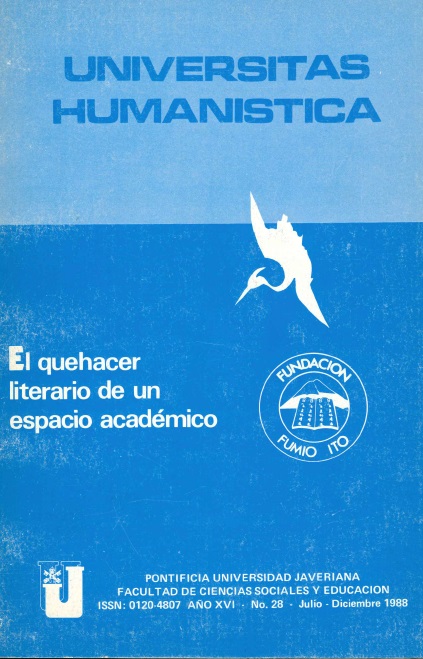Resumo
En los años sesenta, una mesa redonda reunió en París a autores llamados “comprometidos", entre ellos Jean-Paul Sartre, con representantes de la "nueva novela" quienes, como se sabe, no aprecian la literatura comprometida. Los participantes se hicieron la pregunta: "Que peut la littérature?"1. Una traducción podría ser: "¿Cuál es el poder de la literatura?"2. Por esa época, al menos en aquella mesa redonda, Sartre todavía afirmaba que la literatura puede tener cierto impacto en el lector, pero ya le atribuía mucho menos poder que en los años cuarenta cuando escandalizaba a unos y fascinaba a otros con su teoría de la literatura comprometida exigiendo que el escritor confrontara a sus lectores con la realidad para que a nadie le fuera posible sustraerse a su responsabilidad social e histórica.

A revista Universitas Humanística encontra-se registada sob a licencia Creative Commons Versão 4.0 Internacional. Portanto, esta obra pode se reproduzir, distribuir e comunicar publicamente em formato digital, sempre que dado o crédito apropriado para os autores e a Pontificia Universidad Javeriana. Permite-se citar, adaptar, remixar, transformar, autoarquivar, republicar e criar a partir do material, para qualquer fim, mesmo que comercial, sempre que indicado apropriadamente o nome do criador, provido um link para a obra original e indicado se mudanças foram feitas. A Pontificia Universidad Javeriana não retém os direitos sobre as obras publicadas e os conteúdos são responsabilidade exclusiva dos autores, os quais conservam seus direitos morais, intelectuais, de privacidade e publicidade.
O aval sobre a intervenção da obra (revisão, correção, edição, tradução, formatação) e a subsequente difusão disponibiliza-se através de licença de uso e não através de transmissão de direitos, o que representa que a revista e a Pontificia Universidad Javeriana são isentas de qualquer responsabilidade que puder se derivar de uma prática ética pobre por parte dos autores. Em consequência da proteção fornecida pela licença de uso, a revista não fica na obrigação de publicar retratações ou alterar informações já publicadas, a não ser que a errata seja decorrente do processo de gestão editorial. A publicação de conteúdos nesta revista não representa royalties para os contribuintes.


